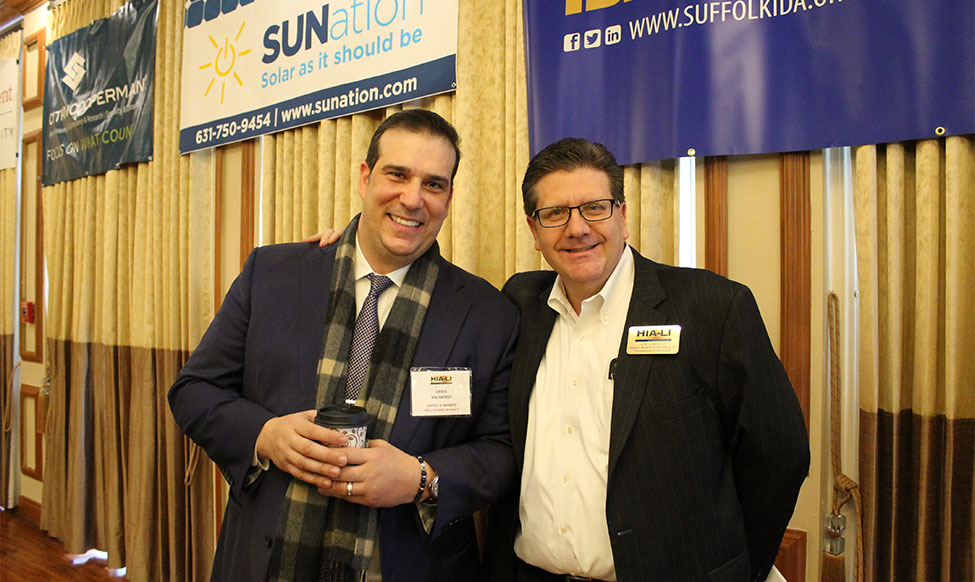By Janine M. Haas
HIA-LI members, board members, executives, and a spectrum of public officials gathered at the Hamlet Country Club on Thursday, January 18, 2019 to celebrate the 41st Annual Meeting and Legislative Breakfast event. The presentation of the 40th Annual Report recapped the past year and outlined clearly its goals for 2019.
Special guests were Congressman Lee Zeldin, New York State Assemblyman Mike Fitzpatrick, Suffolk County Legislature Presiding Officer DuWayne Gregory, Town of Islip Supervisor Angie Carpenter, and Town of Smithtown Supervisor, Ed Wehrheim.
HIA-LI President Terri Alessi-Miceli opened with New Year’s greetings and offered congratulations to the entire organization for a banner year.
Attendees learned that overall, they can expect a year of growth in the park and in employment (as evidenced in the results of the Economic Impact Study and Opportunity Analysis), further initiatives from the HIA-LI’s Small Business Task Force in expanding the available talent pool, and a move to become a clean energy leader with intentions to utilize some 20 million square feet of available rooftop for solar arrays.
“This doesn’t just happen,” Alessi-Miceli declared. “It’s the product of the efforts of our members, our board, business leaders, chairs, co-chairs, volunteers and the esteemed public officials seated here who advocate for our community on a daily basis. Thank you.”
Corporate Secretary Rich Humann announced the latest additions to the board: Castella Imports President and CEO Chris Valsamos and Karen Frank, EVP of Omnicon.
A SUCCESSFUL 2018
Joe Campolo, the HIA-LI Board Chairman and Managing Partner of Campolo, Middleton & McCormick, offered welcoming remarks, described the broad range of accomplishments of the previous year (revitalization of many of the unique downtown areas and significant improvement in transportation with the addition of the third track, the renewed commitment to MacArthur Airport, the continued improvement in sewer infrastructure and water quality), and stressed the importance of the annual event as a way to engage in dialogue with elected officials to ensure continued growth and prosperity in the park and the community beyond.
“We’re proud to make these accomplishments known – that this incredible economic engine that is the Hauppauge Industrial Park has a higher proportion of aerospace, construction, biopharma, business services, education, research and IT businesses than anywhere else on Long Island. It is the premiere hub for growing a business.” Campolo then called out the gorilla in the room – the federal government shutdown.
Though talks at the federal level remained at an impasse, at the local level the debate was civil and focused on the issues affecting Suffolk County. Though most felt the impact had been minimal locally, Presiding Officer Gregory gave examples of constituents who were feeling the pressures of late paychecks. Although the shutdown ended just days after the meeting, as of this writing there remains the possibility of another just weeks away.
THE OPIOID CRISIS
Opioid use is epidemic in Suffolk County and officials discussed action at a federal, state, and local level to enact legislation dealing with education, rehabilitation, prevention, and treatment. All agreed it was a bipartisan issue and that the county shouldered the heaviest burden.
DuWayne Gregory discussed the introduction of Project Connect, a program that aligns overdose patients with rehabilitation services and counselors in the hospital and stated it has had tremendous success. His district also developed a Stay Alive Long Island app that provides information on dealing with overdoses, administering Narcan, and finding treatment.
Mike Fitzpatrick has worked across party lines in the Assembly in providing for better insurance coverage for treatment and the I-Stop prescription monitoring program that prevents doctor and pharmacy shopping.
A contributing factor in Long Island’s opioid crisis, two years ago officials learned that South American drug cartels were targeting Long Island for distribution given the region’s wealth and high level of disposable income.
Lee Zeldin offered that this was probably the most impactful of the issues in Suffolk County, but not at all localized. The problem plagues communities across the nation and the 116th congress will be introducing legislation to deal with it, not just in terms of enforcement, but in prevention and rehabilitation as well.
“We will work together to move the ball forward in prevention, education, rehabilitation, and treatment,” the congressman declared.
ECONOMIC DEVELOPMENT
Smithtown Town Supervisor Ed Wehrheim and Islip Town Supervisor Angie Carpenter discussed some highlights of the massive economic development underway in the towns of Smithtown and Islip.
MacArthur Airport is of major importance to the Town of Islip. The Veteran’s Highway corridor is headquarters to many companies with ridership up 25% since last year and servicing 1.6 million airport passengers.
“Development at MacArthur Airport and the corridor will be energized by broadening the kinds of businesses that can be in that corridor. Our focus is on development with stable taxes,” Supervisor Carpenter claimed.
Supervisor Wehrheim agreed that stable taxes, strong development, and working as a team are key to success in 2019. “To date, we have over two million square feet of construction going on and we are already through the approval process for 740,000 square feet right here in the park,” he advised.
The town had recently rezoned Motor Parkway to allow buildings to go as high as 62 feet and is in the process of creating a new comprehensive plan for the town of Smithtown, the first in over 55 years.
CONTROLLING COSTS CONTROLS TAXES
For Long Islanders, the real gorilla in the room is taxes. On the federal level, Congressman Zeldin focused on the $10,000 cap on SALT deductions which, in a high tax state like New York, hit hard.
“There is a double taxation argument and a lot of debate about the changes in the SALT deduction,” the congressman stated and offered hope that the congress might pass legislation benefitting tax payers on a personal level as well as extending the tax credits and extenders set to expire at year end.
On the state level, Assemblyman Fitzpatrick, expressed frustration with a growing number of New Yorkers fleeing high taxes, likely costing the state two congressional seats. “Where are they going?” he asked rhetorically.
“They’re going to Florida, Texas, Tennessee, and Virginia.”
All members of the panel believed government could do a better job and understood it is imperative to hold the line on costs and taxes.









